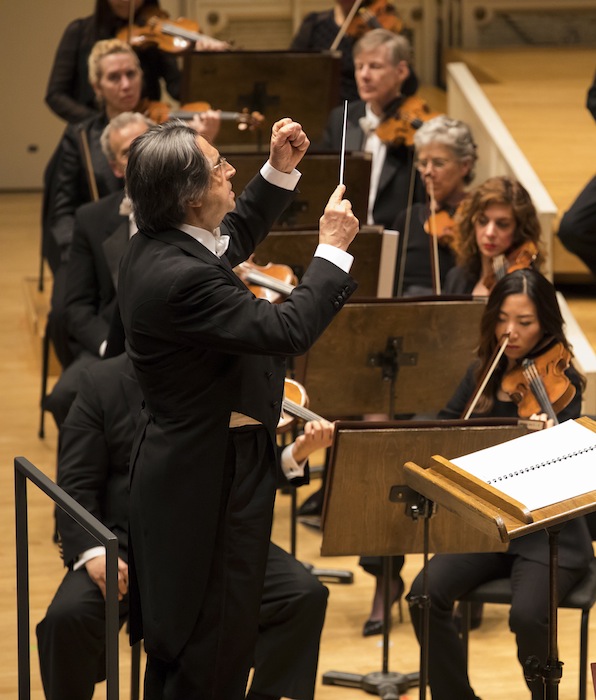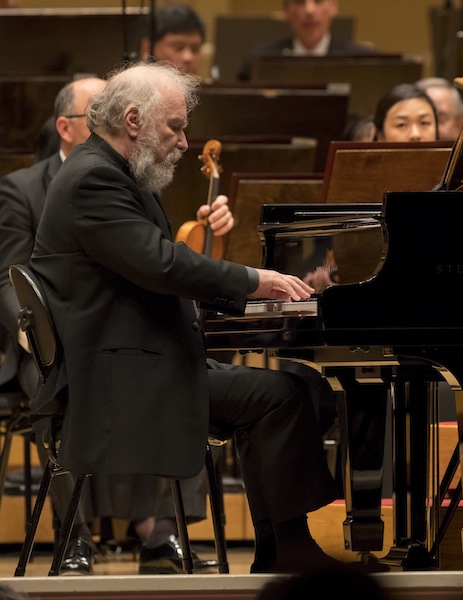Muti, CSO go to hell with Liszt’s “Dante” Symphony

The maestro is back in the house.
Riccardo Muti has returned to Chicago for his final extended residency of the season, opening the first of three weeks Thursday night with a program of Liszt and Beethoven.
Like his “Faust” Symphony, Liszt’s Symphony to Dante’s Divine Comedy is a programmatic work fired by his enthusiasm for a favorite work of literature–in this case Dante Alighieri’s tripartite Divine Comedy, depicting the poet’s metaphorical journey through hell and purgatory to heaven.
Liszt’s friendship with Wagner was at its peak at the time of this work and the composer dedicated the epic symphony to his younger colleague, taking up nearly all of Wagner’s suggestions for the work. Most notable was Liszt not setting a “Paradisio” movement and ending the symphony quietly.
The “Dante” symphony has not been performed by the CSO since Daniel Barenboim led the last performances in 1992.
Every 25 years or so seems about right. Despite fiery advocacy on this level, the fact is that Liszt’s “Dante” Symphony is not a very good piece. Spanning over 50 minutes, the two unwieldy movements are characterized by banal themes, tritely scored (how many rising harp arpeggios can one take?). The second movement “Purgatorio” is especially barren—overlong and meandering with the women’s chorus in the final section verging on kitsch. Even Liszt’s problematic “Faust” symphony seems like a masterpiece by comparison.
There was certainly no lack of power and commitment in the performance. Muti launched into the “Inferno” opening movement with characteristic (and apt) fire and intensity, the main theme pounded out by roaring brass and two sets of timpani. The contrasting sections received playing of polish and delicacy. Muti drew Italianate string warmth in the love theme for the doomed lovers Paolo and Francesca–no match for Tchaikovsky’s memorable treatment in his Francesca da Rimini--and J. Lawrie Bloom and Scott Hostetler contributed evocative bass clarinet and English horn solos, respectively.
Muti’s high-definition style, in many ways, threw the disjointed emptiness of much of the ensuing “Purgatorio” movement into even more unsparing relief. Still, soprano Alison Wahl sang her brief solo from the top of the lower balcony with pure tone and the women of the CSO Chorus lent the right, ethereal promise of heavenly salvation in the closing section. Muti opted for Liszt’s revised ending and failed to make a case, with the louder, more theatrical coda feeling tacked on and vulgar.
In the evening’s first half, the season-long survey of Beethoven piano concertos closed on a sad note with Radu Lupu in the mighty “Emperor” (No. 5).
The Romanian pianist has been a regular CSO guest for over four decades and enjoyed a long and distinguished career, one especially notable for his refined and probing performances of Schubert and Beethoven.
At 71, Lupu is four years younger than Muti but there could hardly be a greater contrast in the physical energy and musical command of the two men. Health problems appear to have affected the pianist’s musicianship, with his playing growing fallible in recent seasons.
Unfortunately, Thursday’s “Emperor” showed the soloist as a pallid shadow of what he had once been. Even in his prime Lupu was never a power pianist but his feeble, error-prone performance was painful to witness, with playing that barely approached the level of an amateur student let alone that of a celebrated international artist.
The weakly projected opening piano flourishes were the opposite of heroic, lacking in heft and authority. Outer movements proved an ordeal with repeated clinkers, dropped notes left and right, and muddy passagework that threatened to go off the rails completely.
There were fleeting moments–mostly in the Adagio–when Lupu displayed glimpses of the patrician poise and delicately colored playing he was renowned for. But for the most part, Lupu’s technical lapses ruled the evening with digital slips in nearly every third bar.
Perhaps compensating for his soloist, Muti’s aggressive accompaniment seemed like the conductor was already in Liszt-Dante mode, with hard-edged, tightly coiled orchestra playing that felt especially tense and joyless in the concluding Rondo.
Lupu was warmly embraced by Muti after the performance and received extended applause and curtain calls from the audience. But it was hard to avoid the feeling that the ovations were less for the evening’s performance than a tribute to a great artist at the twilight of his career.
The program will be repeated 8 p.m. Friday and Saturday. cso.org; 312-294-3000.
Posted in Performances






Posted Apr 28, 2017 at 6:46 pm by Anne-Marie
You’re totally accurate in your assessment of Mr. Lupu’s performance and I too came out disappointed once again. The last time I heard him, over three years ago, his playing was already lethargic and anemic – it was a Beethoven concerto as well. I wish the CSO would not bring back these artists whose glory days are long gone because the time spent by both orchestra and audience is wasted- particularly when the piece is a beloved classic.
Posted Apr 28, 2017 at 8:41 pm by Spencer
I gave hearty applause to celebrate Lupu’s long career. I wasn’t inspired by the performance, but wanted to show appreciation for his career.
Posted Apr 29, 2017 at 12:11 am by Paul
You nailed it. The clunkers and loss of technique wouldn’t have been so dispiriting had the musicianship been evident. The tempos were lethargic (Muti seemed to be like a dog pulling st the leash [the pianist] that was holding him back, the phrasing and articulation was muddled and the pedal was overused. Schnabel missed a lot of notes also, but his musicianship rendered that irrelevant.
Chicago audiences are an embarrassment. Leaping to their feet with another standing ovation (which have lost all meaning whatsoever). Really?? Standing Ovation??????
Posted Apr 29, 2017 at 12:46 am by Yige Li
Just came back from Friday’s (28/4) concert, and enjoyed it.
We all know Lupu’s style, right? We all know he is 71, right? Other than critics who had to go to the performance, shouldn’t one choosing to go to this concert have already pre-accepted such kind of playing? Why the disappointment as if it’s a surprise?
Lupu’s playing wasn’t the standard way we associate with this concerto and didn’t seem to be the best fit. However, for a piece presented (overly!) frequently by CSO, it’s not too much harm to have a stylistically outstretching performance for once. Can’t we just forget, for a while, the 10, or 100 performances of this concerto we’ve heard before? Just listen to it as if we are listening to this music for the 1st time (and are not going to have repeat listening). The color Mr. Lupu displayed on piano, the way of his organic phrasing, the usage of rubato, the almost lost art of slightly out-of-synchronization between two hands (admitted that it suits romantic music better)–in all, they made up a very telling performance. One could like or dislike (even hate) what was told, but one cannot deny the present of some unique message.
Ideally, I would like to see a middle-aged instrumentist having all–solid technique, great musicianship, a fully-developed personal style, enough experience, like Sergei Babayan who displayed all these in the recital last night (27/4) in Northwestern. But if I have to choose, give me the sloppy but interesting Radu Lupu any day than the note-right but wooden Paul Lewis who played the same piece with CSO 2 seasons ago (my God, so boring). Or, why didn’t I just stay at home and listen to my CDs?
Posted Apr 29, 2017 at 10:45 pm by Anne-Marie
In response to Yige Li’s comments, let’s borrow from Shakespeare: “The fault, dear Brutus, lies not in our stars but in ourselves…”
Having had a previously disappointing experience with Mr. Lupu, I decided to see if perhaps he had simply had one off night and, being the seasoned artist that he is, hoped that he would do better. After all, I recall that CCR had given him a good review after his last appearance with the CSO a year or so ago. Hence, the disappointment at another lackluster performance.
Age is not necessarily the extenuating excuse for after all, Maestro Muti is 75 and is in excellent form; Placido Domingo is 76 and still moves audiences with his voice- albeit no longer as a tenor but as a baritone, etc. etc!
To me the crux of the matter was, aside from the technical mistakes, that Mr. Lupu seemed to play without the heart, the spirit that should infuse this oft-played masterpiece. There was an underlying sense of ennui that resulted in another surprise letdown. I simply could not stand to give him a standing ovation. Fortunately we do not boo as they do at La Scala or Paris.
Posted Apr 30, 2017 at 2:51 pm by Steve
I attended the Thursday performance of this program. Radu Lupu is one of the finest pianists in this world. Yes, there were note slips, but they did not detract from his renowned purity of tone and sense of color – especially evident in the Adagio. What was disappointing, however, was that a cellphone rang at the very beginning of the Adagio, and that caused Maestro Muti to restart the famed movement, which sadly isn’t that rare of an occurrence here in Chicago.
With regards to the Liszt, I thought Maestro Muti made an excellent case for the piece, and he truly brought the drama of Dante’s Divine Comedy to the forefront.
Posted May 01, 2017 at 8:00 am by Jo Ann Raphael
I was at the concert Saturday night. Mr. Lupu seemed to have regained his pulse and none of the ennui or the clinkers seemed to be in evidence. I would say he recovered from whatever was bothering him earlier in the week. I will agree that the third movement was a bit on the slow side for me and should have been a little more light-hearted. However, the playing was ethereal and the second movement achingly beautiful. This is a musician who is able to bring out the depth of a piece and I can see why he is so acclaimed.
Posted May 01, 2017 at 2:13 pm by Andrew
I’m sorry that I missed this divisive performance by Radu Lupu, but the fact remains that I would not have paid the CSO’s ticket prices to hear a program anchored by the “Dante” Symphony.